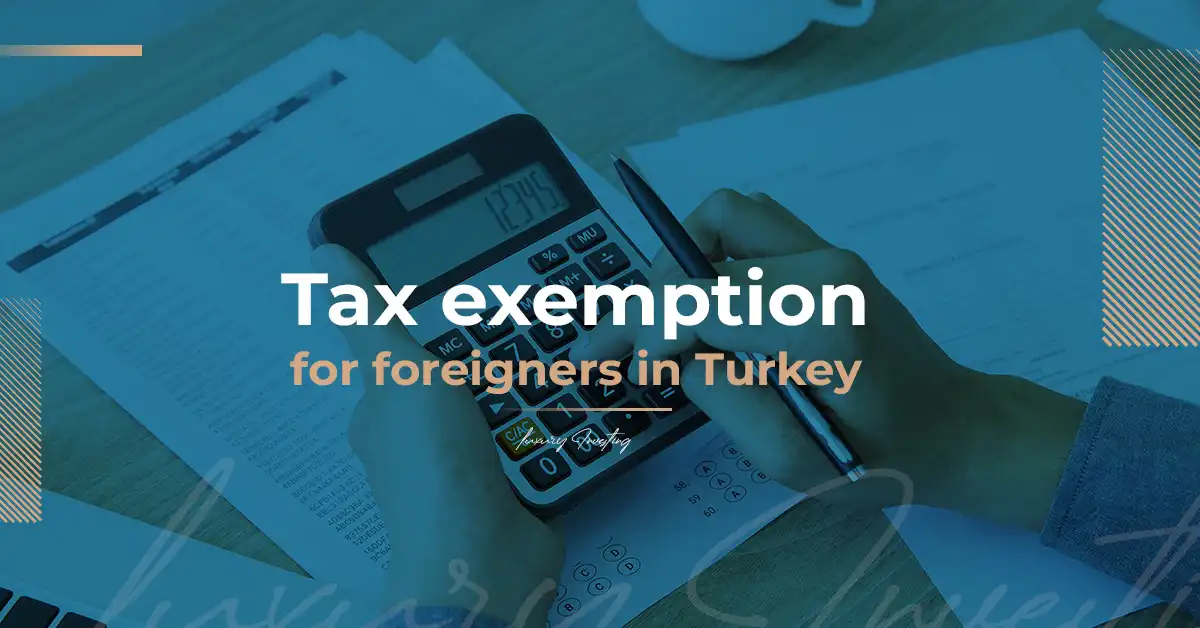
Exemption for Foreigners in Turkey 2025
Table of Contents
Turkey is one of the most attractive and preferred destinations for foreign investors, due to multiple factors that make it an ideal investment environment. Firstly, the Turkish economy is characterized by constant growth and the ability to adapt to global economic changes, providing investors with confidence in the stability of their investments. Additionally, Turkey's unique geographical location plays a crucial role in this attraction, as it sits at the crossroads between Europe and Asia. In the framework of enhancing the investment climate, the Turkish government adopts incentive policies such as tax exemptions aimed at increasing the inflow of foreign capital. These exemptions provide foreign investors with tangible financial advantages, such as reducing tax burdens related to purchasing real estate or establishing new projects, thereby lowering the total cost of investment and increasing the appeal of investing capital in the Turkish market.
The encouraging tax system, alongside government initiatives, offers a flexible and conducive business environment for foreign startups and investors looking to expand into targeted markets. Collectively, these factors not only help attract direct foreign investments but also contribute to enhancing the local economy by creating job opportunities and increasing productivity. Through these policies, Turkey reaffirms its commitment to promoting foreign investments and providing all possible means to support and grow their businesses, forming a valuable opportunity to stimulate economic growth and drive sustainable development.
Meaning of Tax Exemption in Turkey
A tax exemption is a government policy aimed at reducing the tax burden on individuals or companies to achieve specific economic goals. In Turkey, tax exemptions for foreigners are designed to attract investors and facilitate the establishment of new businesses.
Types of Tax Exemptions in Turkey
- Exemptions on Real Estate: Properties purchased by foreigners for the first time are exempt from VAT, provided the funds are transferred from outside Turkey.
- Tax Exemptions for Investment Projects: Include tax reductions for companies establishing new projects in specific sectors such as industry and technology.
- Exemptions for Startups: The Turkish government offers tax incentives for startups founded by foreigners, especially in technology centers and free zones.
What are the Conditions for Tax Exemption When Purchasing Real Estate in Turkey?
- The property buyer must be a foreigner not residing in Turkey.
- The property must be new.
- The property should not be sold for one year from the date of purchase.
- The property must be purchased in a foreign currency, such as the USD or Euro.
- The purchase amount must be transferred from a bank outside Turkey to a Turkish bank or brought in through a Turkish airport.
Significance of Tax Exemptions
The tax exemptions granted by the Turkish government to foreigners play a pivotal role in stimulating and enhancing the Turkish economy on multiple fronts. Primarily, these exemptions are an effective tool for attracting direct foreign investments, as they offer financial incentives that encourage investors to channel their capital into the Turkish market. Such investments typically manifest in the form of establishing factories, founding new companies, developing real estate projects, and other economic activities that require significant capital.
In addition to attracting investment, tax exemptions directly contribute to creating new job opportunities. New projects and investments require a substantial workforce to operate and manage them, thus providing employment for local citizens and reducing the unemployment rate in the country. Increased job opportunities also enhance the purchasing power of consumers, which in turn leads to a revival of local markets and an increase in demand for goods and services.
Moreover, the inflow of foreign investment bolsters Turkey's capability to expand its foreign trade volume. Projects supported by foreign investors help extend the range of products and services produced in the country, thereby opening markets for new exports and improving earnings from foreign currencies. This growth in foreign trade enhances the balance of payments and propels the economy forward.
Additionally, the influx of foreign investments and the improvement in foreign trade contribute to the development of infrastructure. The state needs to improve transportation networks, supply chains, and energy resources to accommodate the increase in economic and service activities. Consequently, infrastructure improvements attract more investments, creating a cycle of economic growth and sustainable development.
Thus, Turkey significantly benefits from the tax exemptions granted to foreigners, as they function as an economic efficiency that bolsters its developmental capabilities and positions the Turkish economy as one of the most dynamic both regionally and globally.
Frequently asked questions
Tax exemptions attract foreign direct investment, contribute to creating new job opportunities and increasing the volume of foreign trade.
New projects require a large number of workers to operate them, which provides job opportunities for local citizens and reduces the unemployment rate.
The continuous growth of the Turkish economy, the ability to adapt to economic changes, and the unique geographical location.
These include exemptions on real estate properties, exemptions for investment projects, and special exemptions for start-ups.
The buyer must be a foreigner, the property must be new, the property must not be sold for a year, and the purchase must be in a foreign currency.
The Turkish government adopts encouraging policies to promote foreign investments and provide incentives to support and develop their businesses.








